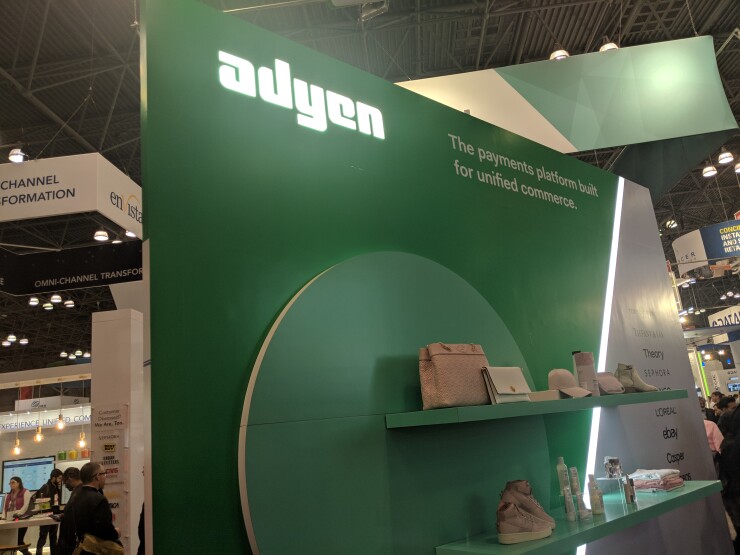Adyen's accumulation of merchant services now includes lending, as the Amsterdam-based firm rounds out its product mix to present itself as an alternative to financial institutions and U.S. payment companies.
"For small businesses, success is closely tied to being able to access capital quickly. But this has not been historically easy within the traditional small-business banking model," said Hemmo Bosscher, vice president of platforms and financial services at Adyen.
Adyen last week debuted two financial services, Capital and Accounts, in the European Union, U.K. and U.S. Adyen faces competition from PayPal, Stripe and Square, along with merchant acquiring banks in all three regions, requiring a diverse range of products accessible through a single relationship.
"Offering these sorts of products is table stakes at this point," said Marco Salazar, director of payments at Javelin Strategy & Research.

Adyen's Accounts offers users a venue to store and access funds, and pairs with another Adyen product, Issuing, which allows users to obtain payment cards. Capital uses an application programming interface to power credit for small businesses. Adyen makes risk assessments using machine-learning algorithms based on incoming payment flows.
"This takes the arbitrariness and time investment out of loan applications for users," Bosscher said. "Qualifications are no longer based on location or on business plans."
The payment technology companies that offer merchant credit often pitch their products based on the detailed data they obtain by processing payments, contending most banks perform manual evaluations for small-business loans, which takes more time and leaves many small business owners out. Block (formerly Square) and PayPal have made inroads into small-business lending in recent years, building on their payment processing relationships with merchants by offering short-term credit. The companies use payment data to make loan decisions quickly, and take a cut of future revenue to pay down the loans.
Community banks are responsible for about 36% of small-business loans, down from 42% over the past decade, according to the
Legacy financial institutions face a battle. Small businesses are increasingly using more than one financial service provider, leaving an opening for fintechs, according to
"For traditional banks, the business of smaller loans is not profitable and thus underserved," Bosscher said.
At Adyen, prospective borrowers go through an eligibility check at the time of onboarding, which also includes a know-your-customer money laundering check. That allows the merchant to avoid these vetting steps for future lending.
A candle maker on Etsy, for example, would work with Capital to access finance on the platform they use to run their business, which Bosscher said cuts down on the time the seller needs to wait for a bank loan to go into their account.
"The funds extended can be deployed for any business purpose. We believe the user knows better what to use credit for than us," Bosscher said. The users repay the credit daily based on a fixed percentage of their sales processed through Adyen, taken from incoming payment flows.
"This also means that there is no risk of an accidentally missed payment and associated penalties," Bosscher said.
Adyen's financial services products follow upgrades to its
And in August, Adyen adopted
One of the benefits of the new financial services products is to increase the amount of SKU-level data, or stock keeping units, according to Salazar. This added data, which includes where and how consumers shop and pay, can inform product development, including decisions on marketing and incentive programs; and whether to offer consumer credit such as buy now/pay later.
"Because they are targeting small merchants, which don't necessarily have all of the resources to offer a lot of programs by themselves, Adyen, Square, Stripe and the others can offer a 'black box' where merchants can access all of these tools," Salazar said.






